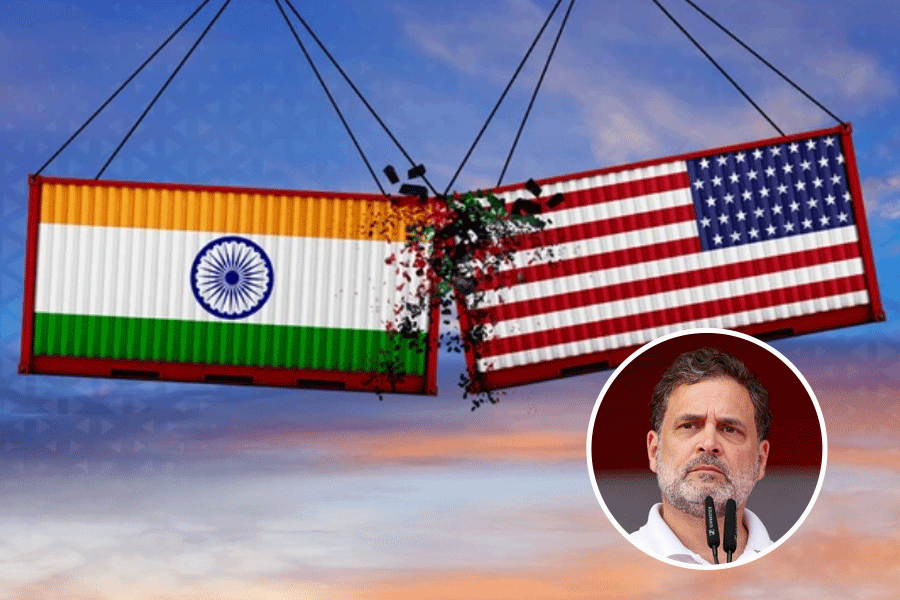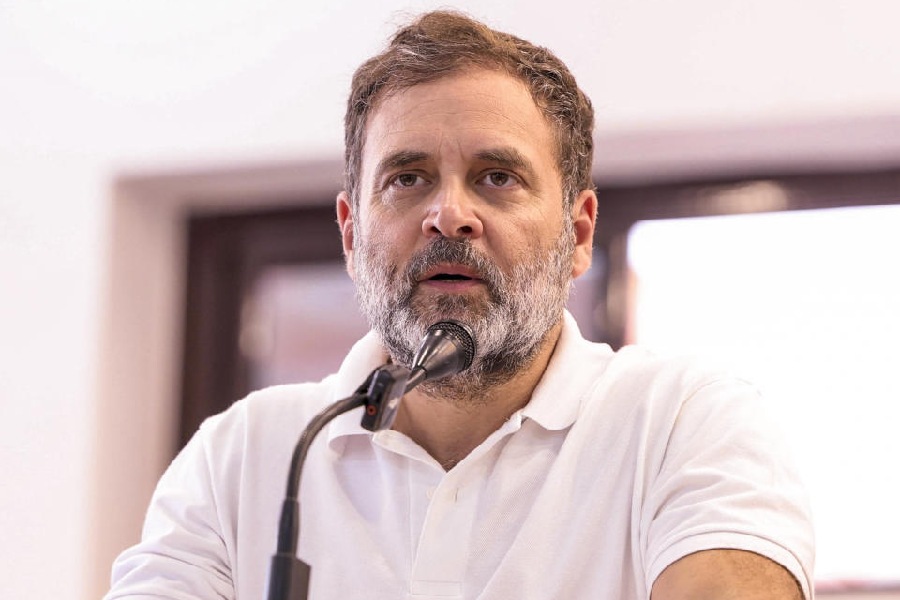 |
| Kitty Menon (top) and Lakshmi Sehgal (below) |
 |
Two nonagerian ladies died recently. They had sort of an overlap: both had political affiliations, belonging to the same political party. But, the greater coincidence was the several challenging frontiers they crossed during their lifetime, never looking back, with not a regret for the decisions they took at different junctures. Of the two, Lakshmi Sehgal, 97 when she died, had been a celebrity and a household name in the country since the mid-1940s. The other lady, Kitty Menon, chose in her early thirties to move away from the limelight. One could not help her celebrity status, the other preferred to step down from a position which threatened to keep her in prominence. Neither waited for an external agent to shape her destiny. Both carved their own destinies and were tranquil about it.
Let the narration begin with the woman who was not so famous at death, Kitty Menon was born in 1922 as Kitty Woomla, the doting daughter of a filthily rich Parsi business family settled in London. The family was swimming in money. The daughter was sent to a finishing school and ended up at the London School of Economics. There she fell in strange company and crossed life’s first frontier: the rich Parsi businessman’s daughter joined the communist party. This was not an altogether unique event; in an earlier phase, a nephew of Jamsetji Tata no less, had done the same thing while based in London. Kitty’s case was special in the sense that, unlike Shapurji Saklatvala, whose perambulations as a communist activist were based exclusively in England, Kitty Woomla forsook the luxurious living in the lap of the fabulously rich family in cosy London, and decided to rough it out in India for the rest of her life.
Such ‘de-classing’ — demoting oneself from a level socially considered to be superior to a less important and conspicuous one — was not confined to just one sphere. While in London, Kitty was a key functionary of the World Federation of Democratic Youth, with headquarters in Budapest, which was, in the latter half of the 1940s, the umbrella outfit of politically radical youth formations all over Europe and elsewhere. Kitty was then a globetrotter, always much in the news and one of the principal organizers of the South-East Asia Youth Conference held in Calcutta in February 1948 preceding the second congress of the Communist Party of India. Decisions taken at that conference, it was at the time the general impression, had heavily influenced the tactical line adopted by the CPI congress.
It was quite something when Kitty decided to move to India on a permanent basis in 1949, living at the party commune in Bombay as an ordinary cadre and slipping into near anonymity. She could not care less; she was back home in India among her suppressed, exploited countrymen, she was serving their cause, there was no greater fulfilment. She was as happy as a lark.
But a stiffer personal challenge was awaiting her. She met at the Bombay party commune a comrade from Kerala with a most humble social background; they got mutually attracted and decided to take the vow together. Marriage, however, created complications. The paltry party wages would not be enough if they were to raise a family, which they very much wanted to do. One of them had to sacrifice the luxury of the princely party wage of Rs 25 per month and seek an outside job. In other words, one of them had to give up whole time membership of the party. Kitty had a BSc from the LSE; Ramdas Menon was less qualified and therefore had less market value. The gender issue did not intrude; it was practical economics, it was easier for Kitty to secure a teaching assignment which guaranteed adequate remuneration. This in a sense was the final frontier Kitty had to cross: sacrificing full-time work for the party and receding into grey existence as an earning housewife with only spare time activities for the party. That was her fate until her retirement from the Delhi School of Economics in the 1980s. By then she was an old, shrivelled, ailing woman. She had sacrificed luxurious living in England, she had disowned her class roots, she had given up political prominence to work as a humble foot soldier for the cause. Finally, she denied herself even that feeling of contentedness and withdrew to the relative passive living of a party part-timer.
The trajectory of Lakshmi Sehgal’s life was different, but not altogether dissimilar. She was born to both affluence and celebrity. Her father, Subburama Swaminathan, one of the leading barristers practising at the Madras High Court during the inter-war period of the last century, was fabulously rich. Her mother, Ammu Swaminathan, was no less of a prominent figure. While the husband earned money, she ran an elegant, efficient household where meals served to guests at frequently arranged evening parties were a sophisticated blend of Western and Indian cuisines and the children spoke mostly English. That was not all. Ammu, a self-taught woman, had a mind of her own. She was drawn into the nationalist movement, joined the Indian National Congress and, in course of time, became a pet of Jawaharlal Nehru, ending up as a member of the constituent assembly and of free India’s first Parliament. Affluence and ardour, for ‘nationalist’ politics made a satisfying cocktail. The elder son in the family, Govind, was like the father, a leading light of the Madras bar, earning pots and pots of money, but at the same time was a cynic at large and a great espouser of radical causes. Lakshmi’s younger sister, Mrinalini, wafted away to be a danseuse. She chose as her husband the Ahmedabad-based space scientist and industrialist, Vikram Sarabhai. Lakshmi Swaminathan herself was a flighty, dreamy girl during her teens. Keen to break new ground, she enrolled for a degree in medicine. A hasty marriage to an airline pilot led to quick disenchantment and an equally quick divorce. Perhaps to forget that episode, Lakshmi hopped across the Bay of Bengal to Singapore and joined the government medical service there. Japanese occupation trapped her. Suddenly things began to happen. It was 1943, Subhash Chandra Bose was in Singapore. His charisma mesmerized Lakshmi. The young medico, fond of frolicking parties, awoke to the fact that there was quite a bit of her mother in her; she was, like the mother, a nationalist, a patriot. The call of this great leader, Subhas Chandra Bose, exhorting her to join the ranks of the Indian National Army to liberate the nation, could not be turned down. Her Netaji was inviting her to cross a crucial frontier. She forsook all thoughts and jumped at the invitation. The doctor’s apparel was in a jiffy substituted by the uniform of an army officer. She raised the Rani Jhansi Regiment which saw action, alongside INA troops, in north Burma and Imphal. By 1945, it was, however, all over. Following Hiroshima and Nagasaki, Japan surrendered. Subhash Chandra Bose got into a plane at Saigon to meet a mysterious end which till this day is fodder for speculation. The British moved back to their former possessions in Southeast Asia and Lakshmi was imprisoned. She was released only when the authorities, daunted by surging public sympathy for the INA were forced to declare a general amnesty for those who had enrolled for it.
Lakshmi Swaminathan was by then a legend and the focus of intense public adulation. She moved from one city to the next, from one reception to the next, and was hailed as, really and truly, the incarnation of Rani Laxmibai. This was precisely the time for her to cross another frontier. Given her family background and her mother’s connections, she could have remained in the public glare, joined the Congress as a distinguished member and instantly become a ‘national leader’. It would have been a matter of routine for her to enter the council of ministers, either at the Centre or in Madras. She said nyet, her concept of serving the nation was different. She and Prem Sehgal, one of the INA trio whom the British chose to chargesheet at the historic INA trial at Delhi’s Red Fort, had known each other from Singapore. Once the round of receptions for the INA heroes and heroines was over, they got married and shifted to the relative obscurity of Kanpur. Prem Sehgal found a professional assignment to his liking there and Lakshmi Sehgal decided to return to medical practice as the appropriate medium of service for the cause of the people. Here again, she crossed at least a sub-frontier. She could have set up chambers in Kanpur’s posh colony where the mill magnets lived. Her name and fame would have been warranty for huge earnings. No, she rented rooms next to the slums which Kanpur’s mill workers occupied. In due course she established a miniature hospital where she would render free medical advice and succour to the workers and their hapless families. That was mostly her existence for the next half a century.
It was not far later that Lakshmi Sehgal had to cross her ultimate frontier. The more she observed, at first hand, the plight of the exploited workers in the cotton mills and other factories in the neighbourhood, the greater was her realization that rendering medical service was not enough, social and economic exploitation of the poor, suppressed masses — who constituted the nation’s overwhelming majority — had reached such deadly dimensions that she must persuade herself into entering a new role: political activism was called for on her part if she were to satisfy her conscience. Serving the people was serving the nation; that is what patriotism was all about. Her patriotism now guided her to move into active political work. The party her mother belonged to, she had discovered, did no longer serve the cause of the people. It had actually merged its identity with society’s exploiters. It could not be her choice. Crossing the very last frontier, she joined the Communist Party of India (Marxist). Others might feel cynical or derisive about her choice, but it was her decision, she was happy with it; she was Lakshmi Sehgal; any further questions?
Nonagerians die, two nonagerian ladies, Lakshmi Sehgal and Kitty Menon, are dead. Their lives may or may not fill copious pages of history. Never mind, in their own manner, they crossed extraordinary frontiers.










